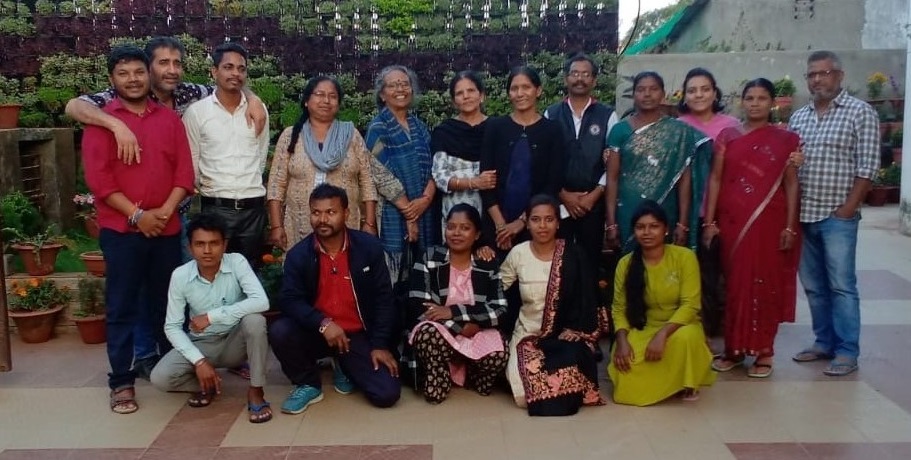Women, Work and Migration: Community-led initiatives in Chhatisgarh, Jharkhand and Odisha

Namrata Daniel, 25 March 2020
In February, GAATW organised a meeting ‘Women, work & migration: community-led initiatives in Chhatisgarh, Jharkhand and Odisha’. It took place in Bhubaneswar, Odisha, with representatives from seven civil society organisations that work with women and marginalised communities in the three states. The purpose was to discuss and understand the structural factors that cause the inter-state labour migration of women from these three origin states.
The discussions were focussed on developing a holistic approach to human trafficking and labour migration issues through community-led initiatives. The aim of this work is not to stop the workers from migrating, but instead to identify the structural drivers pushing them to migrate and the ways in which we can empower local communities and create better livelihood options for them. With a strong community work and engagement with the workers, the aim is to improve the economic conditions of the community, for example, by focussing on the implementation of government schemes and programmes on livelihood generation, education, health care, child care etc. The community work should ensure better linkages between different government schemes for empowerment of local communities and especially women workers.
At the meeting, participants emphasised that the aim of our work is to strengthen community-level engagements with the marginalised communities, as well as with adolescent girls and women. But in this process, it is equally important to build the capacities of community workers as they are crucial in strengthening the community-level work: first, because they identify the local issues that are important to the women and second, because they will play an active role in addressing these issues later on.
Participants highlighted that the organising of the local communities should be around creating a worker’s identity, especially for women workers. The process of organising the women is important because they do not see themselves as workers in either the public or private spaces. The community and family do not recognise and value women’s unpaid work, so efforts at the community level should be made to recognise and value this work. The community level work should also address the social hierarchies of gender, caste and class, even though these hierarchies are deeply embedded within the institutions of family, community, markets and the State.
The CSOs shared some of the challenges that remain in organising and mobilising the local community and women workers:
- In many villages, women and families have migrated to different cities for work and only elderly people remain.
- In some regions, the Maoist have further added to the problems of local people. The local communities are forced to migrate in search of livelihood because of the constant conflict between the Maoist and the government in those regions. Due to this, implementation of the government schemes and policies remain limited in these areas.
- The local community in the villages have deeply rooted social norms and customs for girls and women, preventing their participation in public meetings.
- Women are occupied with household chores until at least early afternoon, which makes it hard for community workers to engage with them, given that the latter work 9-to-5. Also, as many villages are remote and it is unsafe to travel at night, the community workers have to leave before sunset.
Despite these challenges, our CSO partners were committed to bring a change in their states with their community-level work. They were determined to implement the following in their respective districts and selected villages:
- To open a learning centre, which can provide awareness to the communities, women and students about various government schemes and policies. This space can also be used for discussions and meeting with the women, adolescent girls and migrant workers and have a library where students can come to read and study after school.
- An effort will be made to increase the participation of women in Gram Sabhas (local governance bodies for village development)
- There will be regular meetings with women collectives for recognising and valuing unpaid work within the households as labour. Also, the discussions will aim at creating a ‘worker identity’ for women.
- There will be efforts to ensure that the government schemes and programmes are implemented smoothly to reduce rural distress.
Prior to the meeting, several rounds of discussions with our CSO partners and activists in India made it clear that many engagements and intervention are done at the sites of origin to address human trafficking and ensure safe migration. But the engagement with the workers and especially women workers at the destination sites remains restricted and needs to be intensified. Therefore, in the next stage of this work, we plan to build knowledge on the working conditions of women in different sectors at the main destination sites. The discussions among the participants focused on mutual learning and inter-linking with other social movements within the states working on Dalit rights, Adivasi rights, women’s rights, forest and land rights. This meeting brought some old and new partners together, and new connections were forged that we hope to continue and develop through three State-level convenings and community work in Chhattisgarh, Odisha and Jharkhand in the coming months.

